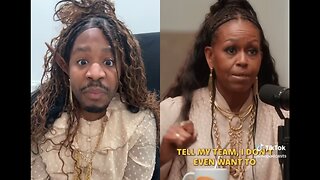Premium Only Content

5 Complications of Diverticulitis You Should Know About
We recently talked about diverticulitis here on our channel. Did you watch the video?
Diverticulitis is an inflammation of the internal walls of the intestine. It is mainly characterized by the formation of small and bulging cysts and sacs, called diverticula, that get inflamed and cause the disease.
But how are the diverticula formed? It is not yet known how the diverticula are formed. A theory is that diets poor in fiber contribute to their formation.
The lack of fiber in the diet hardens the feces, which causes constipation. We end up having to push harder when defecating, which pressures the colon and the intestines and forms these cysts, the diverticula. The build-up of stool causes inflammation.
Any person can develop diverticulitis, being more common in the elderly. Its causes are related mainly to the poor functioning of the intestine.
Also, people who smoke may present a higher risk of forming diverticula since smoking weakens the intestinal walls.
Diverticulitis can stay many years without presenting any symptoms, and sometimes is only found out by accident, during a routine colonoscopy.
However, when there are complications, like the symptoms we talked about, it may be necessary to do ultrasounds or an abdominal tomography to evaluate the seriousness and decide the best treatment.
0:00 Possible complications of diverticulitis
0:58 Intestinal obstruction
1:20 Abscess
1:38 Bleeding
1:58 Fistula
2:38 Perforation
2:55 Diverticulitis symptons and risk factors
----------------------------------------
Facebook: https://bit.ly/38BWbw3
Pinterest: https://bit.ly/2Irvwa6
Disclaimer: The materials and the information contained on Natural Cures channel are provided for general and educational purposes only and do not constitute any legal, medical or other professional advice on any subject matter. These statements have not been evaluated by the FDA and are not intended to diagnose, treat or cure any disease. Always seek the advice of your physician or other qualified health provider prior to starting any new diet or treatment and with any questions you may have regarding a medical condition. If you have or suspect that you have a medical problem, promptly contact your health care provider.
-
 3:55
3:55
Natural Cures
1 year ago $0.93 earnedDrink This Tea Tonight to Flush Out All The Toxins from the Body
3.72K4 -
 30:45
30:45
The Kevin Trudeau Show Limitless
19 hours agoThe 3 Money Lies Keeping You Broke in 2025 {Financial Freedom Explained}
9.06K6 -
 7:31
7:31
ARFCOM News
16 hours ago $0.07 earnedATF Feeling "Demoralized", Trump Tries To Cut Their Budget | Rs Obstructing Pro-Gun Bills
3.98K -
 5:07
5:07
The Shannon Joy Show
10 hours agoFed Up! Government's Dystopian Nightmare and Broken Promises
2.73K5 -
 23:08
23:08
Chris From The 740
1 day ago $0.04 earnedUnboxing the CZ Nocturne F SR – First Impressions & Features Revealed!
3.59K2 -
 53:14
53:14
Feds For Freedom
2 days ago85. The End of the Legacy Media and Surge of Citizen Journalism | Sam Anthony | The Feds
4.46K3 -
 2:38
2:38
BIG NEM
9 hours agoThey Faked Being from Toronto… And Got EXPOSED
3.77K2 -
 35:37
35:37
Esports Awards
15 hours agoLuiz Felipe Tavares from Sim Racer to Real F4 Driver | Origins Podcast #6
4.3K -
 3:31:23
3:31:23
FreshandFit
9 hours agoAfter Hours w/ Girls
486K60 -
 1:08
1:08
Terrence K Williams
10 hours agoWHO WORE IT BEST 😂 Michelle Obama is going to be mad at me.
125K97